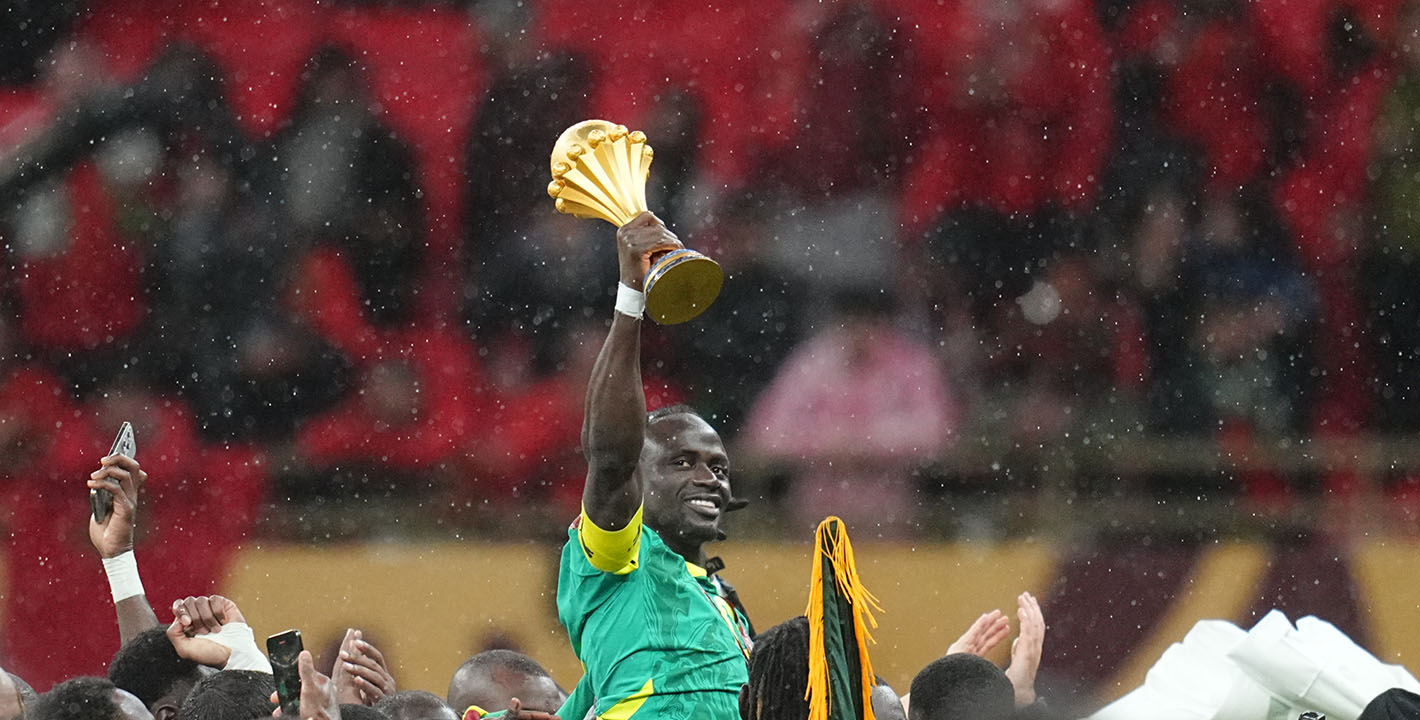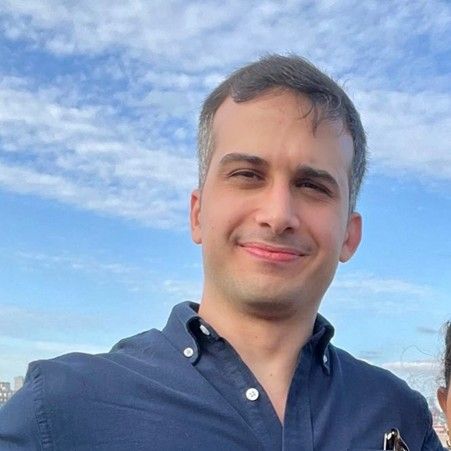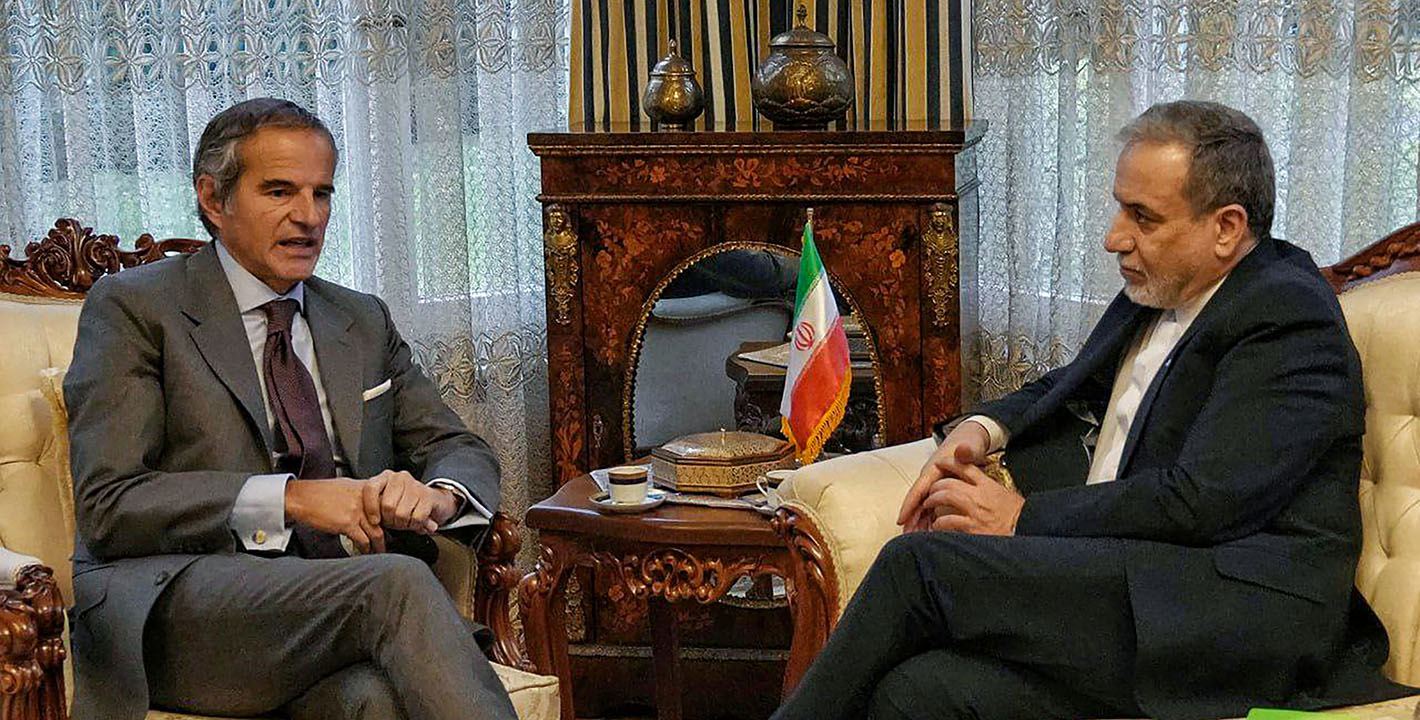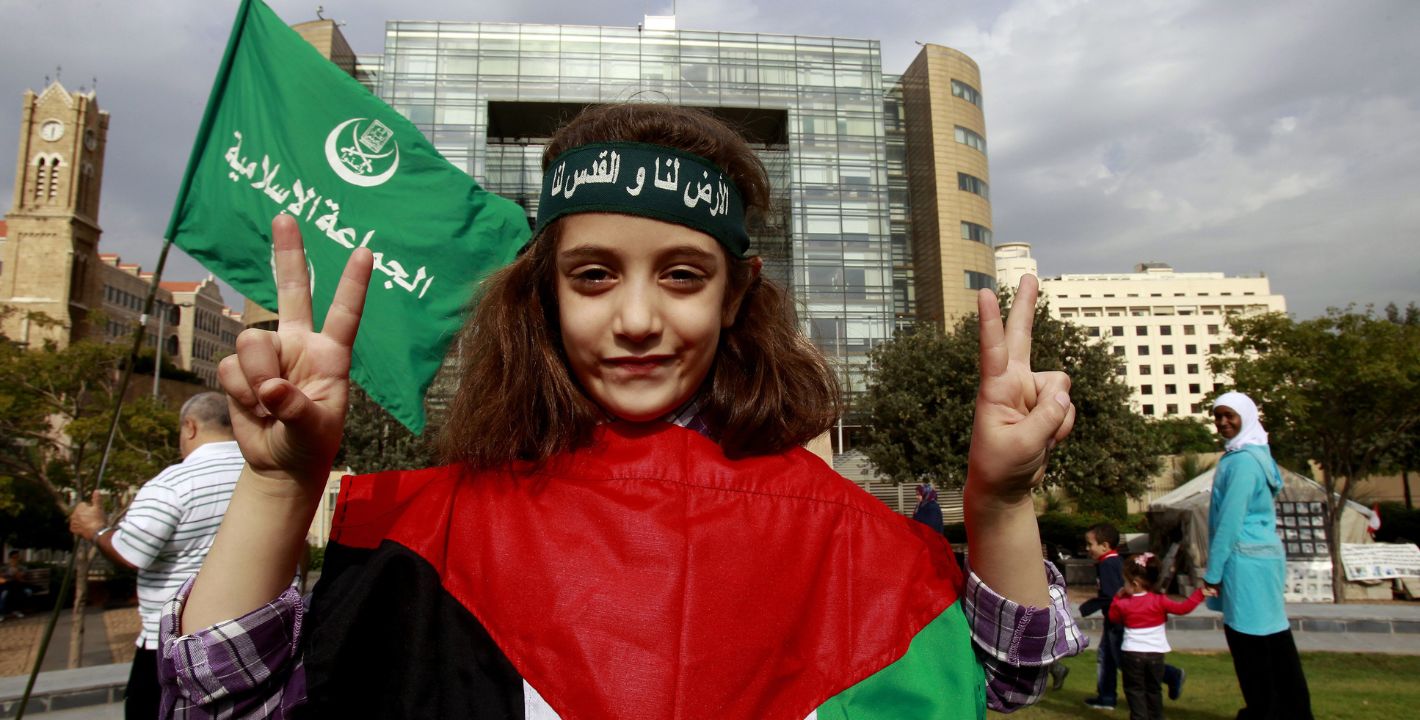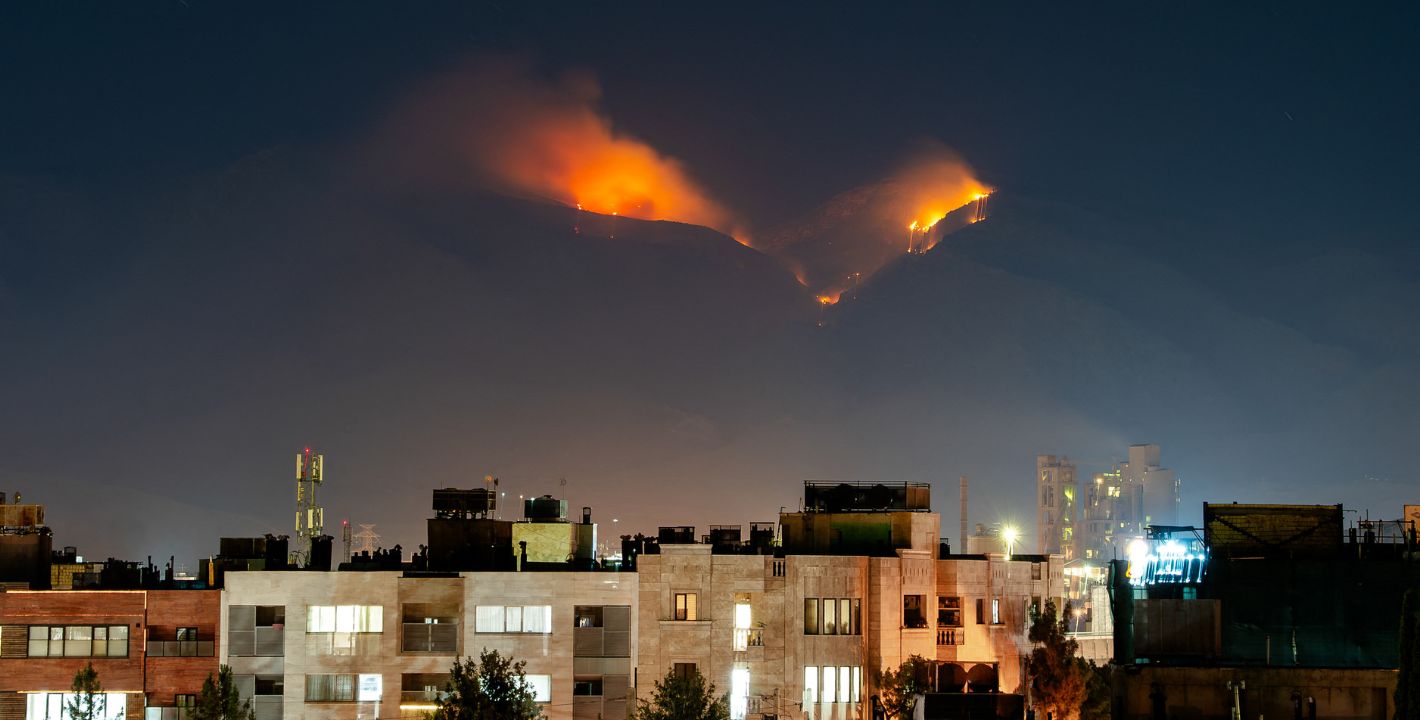Aron Lund
{
"authors": [
"Aron Lund"
],
"type": "commentary",
"blog": "Diwan",
"centerAffiliationAll": "",
"centers": [
"Carnegie Endowment for International Peace"
],
"collections": [
"Arab Awakening"
],
"englishNewsletterAll": "",
"nonEnglishNewsletterAll": "",
"primaryCenter": "Carnegie Endowment for International Peace",
"programAffiliation": "",
"programs": [],
"projects": [],
"regions": [
"North America",
"United States",
"Middle East",
"North Africa",
"Syria",
"Russia"
],
"topics": [
"Political Reform",
"Democracy",
"Security",
"Military",
"Foreign Policy",
"Economy"
]
}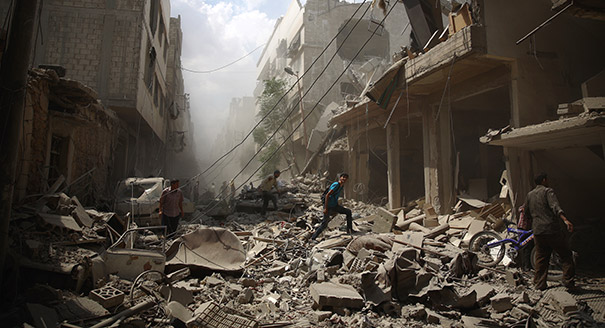
Source: Getty
While the world’s eyes are on Aleppo, where more than 250 people have reportedly been killed in the past two weeks, another drama is playing out in the rebel-held Ghouta enclave east of Damascus, where, on April 28, simmering tensions exploded in a brutal round of internal purges and violence.
This time the battle was not between the Syrian government of President Bashar al-Assad and the Sunni rebel forces seeking to depose him, but between two rival rebel factions. The background to this internecine conflict—which pits the hitherto locally dominant group known as the Islam Army against two newly empowered rival factions—has been discussed in previous articles on Syria in Crisis:
- An Islamist Experiment: Political Order in the East Ghouta (April 18)
- After Zahran: Rising Tension in the East Ghouta (April 19)
In the April 18 article, we looked at the attempts of the various rival factions in the East Ghouta to establish a common political order, exemplified by the 2014 creation of the Unified Judicial Council, and its less-than-stellar performance since then. On April 19, we outlined the situation that has emerged since late December 2015, when the Islam Army’s founding leader, Zahran Alloush, was killed in an airstrike.
Filling a Power Vacuum
To summarize, Alloush’s death was followed by increasing polarization in the East Ghouta. The smaller factions began to coalesce into two main blocs. The most important, Feilaq al-Rahman, is a large group made up of local factions and mainstream Islamist groups that had previously refused to subordinate themselves to the Islam Army. At the same time, a separate coalition emerged under the name of the Fustat Army, which brought together the Nusra Front, a branch of al-Qaeda, with the Fajr al-Umma Brigade, which controls an important smuggling route into Damascus. It seemed as if the Islam Army was being challenged from both ends of the religio-political spectrum at once.
While there had been minor skirmishes during the spring, the current wave of infighting began on the morning of April 28. It followed a ruling by a committee of the Unified Judicial Council, which had investigated the March 28 attempt to murder Khaled Tafour, an influential local cleric linked to Feilaq al-Rahman. The committee accused the Islam Army of ordering Tafour’s assassination, but some clerics dissented, including the council head, Sheikh Abu Abdurrahman Zeinelabidine, who apparently sided with the Islam Army. It remains to be seen whether the Unified Judicial Council can be restored as a cohesive body and whether the Islam Army will be able to restore its dominance across the enclave.
“What happens now is the culmination of two months of problems,” says Wael Olwan, Feilaq al-Rahman’s media spokesperson, who spoke to the author from Istanbul. “It all began when the Ajnad al-Sham Islamic Union, which was a faction loyal to the Syrian Islamic Council, joined Failaq al-Rahman, which is part of the Free Syrian Army.”
The Syrian Islamic Council is a broadly based pro-opposition Sunni Islamic body gathering some of the Syria’s most influential mainstream clerics, including Sufi figures, some moderate Salafis, and adherents of the Muslim Brotherhood. The Islam Army adheres to a more Saudi-inspired version of Salafism.
“When this happened, the Islam Army attacked the former Ajnad al-Sham Islamic Union headquarters in Douma. Then we had similar problems in Zamalka. Then came the attempted murder of Sheikh Abu Suleiman [Khaled] Tafour and the killing of his companion. After that, there were more incidents in Zamalka and Jisrin, and then a big attack about ten days ago in Shayfouniya and Ebb, close to Douma, where they stormed more than thirty of our bases.”
“We in Feilaq al-Rahman began to prepare militarily after the Shayfouniya attack. Then we received word that they were readying themselves for an attack in Mesraba and in Zamalka, and that’s when we reacted.”
(Islam Army spokespersons did not respond to the author’s repeated requests for comment.)
“The Islam Army is on a downward spiral, I think,” says a Syrian source that is closely involved with the armed opposition groups. “A confrontation was a foregone conclusion as soon as Zahran died. There was a power vacuum that Feilaq al-Rahman and the Nusra Front will rush to fill. It's like when a powerful mafia don gets killed and rival families move in to take advantage.”
As might be expected, Failaq al-Rahman’s Wael Olwan views the situation very differently, but he agrees that the death of Zahran Alloush played a role in igniting today’s conflict. “We had some minor problems with Zahran Alloush when he was alive,” Olwan says, “but thanks to his charisma he was mostly able to maintain discipline in the Islam Army. That has changed now. We didn’t see this aggressive rhetoric from the religious officials of the Islam Army while he was alive, but now we do. In that sense, the Ghouta was very strongly affected by his death.”
Some of the fighting seems to be about controlling the economy of the East Ghouta, which is centered on a handful of smuggling routes. The Syrian government has imposed a blockade on trade and humanitarian shipments into the Ghouta. This has led to civilian suffering but also empowered factions that control smuggling tunnels and are able to extract taxes from the merchants using them, much as in the Gaza Strip.
A Foreign Role?
Since many of the rebel factions in the East Ghouta are connected to foreign governments that supply them with ammunition and money, one must not disregard the role of regional states. According to the previously mentioned Syrian source, whose claims the author cannot confirm, the Military Operations Center (MOC), an Amman-based logistics center staffed by American, Jordanian, and other intelligence services, is directly involved in trying to undermine the Islam Army.
While the Islam Army has long been portrayed as a client of Saudi Arabia, these ties are neither clear nor straightforward. The group definitely enjoys the support of private clerics in the Gulf Arab states, including Zahran Alloush’s father Abdullah, a longtime resident of Saudi Arabia. But the Islam Army is also able to extract significant resources from the civilian and military economy in the East Ghouta enclave, including through the tunnel economy. Though it seems broadly aligned with Gulf Arab policies in Syria, the group may in fact be much more independent-minded than its enemies give it credit for.
The United States has resisted Russian demands to designate the Islam Army a terrorist group, pointing out that it is a fierce opponent of the self-proclaimed Islamic State and now also fights al-Qaeda in the East Ghouta. The group certainly does not engage in or endorse international terrorism. But the Islam Army leadership still espouses a starkly fundamentalist and Saudi-inspired theology that is at odds with the more flexible brand of Islamism promoted by, for example, the Muslim Brotherhood. The U.S. has therefore shied away from direct cooperation, anxious not to be tarnished by the Islam Army’s anti-democratic and sectarian rhetoric.
The anonymous Syrian source, who is not linked to any particular rebel faction, claims that Feilaq al-Rahman recently received $1.2 million from the MOC, with the aim of allowing it to buy up smaller factions and challenge the Islam Army's dominance. In the opinion of this source, it is “a deliberate policy by the MOC to weaken the Islam Army and it gives credence to rumors that Jordanian intelligence may have had a hand in the killing of Zahran.”
Wael Olwan denies these claims: “There is no connection between Failaq al-Rahman and the MOC. These are lies being spread by the Islam Army media officials. They claim that we are collaborating with the Nusra Front, working with Jordanian intelligence, and with the MOC, and that we are also trying to help the Islamic State get into the Ghouta,” he says, laughing. “It is an attempt by them to portray us as traitors and agents and allies of extremists, it is how they incite people to fight us.”
If Jordan and other MOC states are indeed trying to marginalize the Islam Army after the death of Zahran Alloush, it is a risky strategy. The group may or may not be on its way down, but one thing is certain: it won’t go quietly. If major infighting in the East Ghouta should continue, the enclave’s defenses against the government will be badly weakened. The area could also split into separate rebel fiefdoms, each of them weak in relation to the government, potentially creating a three-way war in which Assad would be able to manipulate intra-rebel rivalries to his advantage.
The Situation Right Now
After a week of fighting, the East Ghouta seems to have split down the middle.
The Fustat Army has remained silent, while Feilaq al-Rahman and the Islam Army blame each other. Neither will admit to striking first. Feilaq al-Rahman claims that it was forced to defend itself when the Islam Army began to draw together forces and purge dissidents in Douma. Wael Olwan, also insists that there is absolutely no coordination between the Feilaq al-Rahman fighters and the Fustat Army.
“The relation between Failaq al-Rahman and the Fustat Army is very bad,” he told me. “The Nusra Front says Failaq al-Rahman is a secular group and a group of apostates, since we are revolutionaries and part of the Free Syrian Army. The reason they have taken part in some battles [against the Islam Army] is because the main religious official of the Islam Army, Samir Kaakeh, has made unreasonable statements threatening everyone and saying they will conduct a merciless war to eliminate all other factions. We had already informed the Fustat Army that we were preparing for an offensive, to avoid a misunderstanding—we didn’t want them to think we were planning to attack them. So they were ready, and when the Islam Army made the mistake of attacking them too, clashes erupted. But there is no coordination and there are no contacts between us and them, it’s just the Islam Army attacking everyone.”
The Islam Army, of course, refutes this version of events. It has described the outbreak of clashes on April 28 as a jointly planned “stab in the back” carried out by Feilaq al-Rahman and the Fustat Army. Islam Army media officials consistently refer to the latter faction as “the Nusra Front” or “al-Qaeda.” The group reacted with outrage when the clashes began and promised swift retaliation. “God is Great!” exclaimed Samir Kaakeh on Twitter after the attack, “The time has come to extinguish falsehood and its people.” The following day, the Islam Army spokesperson Hamza Bayraqdar issued a menacing video statement threatening Failaq al-Rahman and the Fustat Army, which could be best summarized as: “We’re coming for you.”
And they did. Almost immediately, the Islam Army seems to have wiped out Failaq al-Rahman’s presence in Douma, the region’s key city. It also claims to have “cleansed” the enclave’s southern Marj region. But Feilaq al-Rahman and its allies scored significant successes too, sweeping the eastern neighborhoods of Damascus and laying siege to Islam Army outposts there. There are unconfirmed and probably exaggerated claims that Feilaq al-Rahman and the Fustat Army have by now captured upwards of 700 fighters from the Islam Army, after seizing the Erbeen, Jobar, Sabqa, and Mesraba neighborhoods. Feilaq al-Rahman’s units in Mesraba seem to be cutting contact between Douma and the rebel-held regions of eastern Damascus, thereby depriving the Islam Army of access to important frontline positions and smuggling routes. According to the Islam Army, jihadi forces belonging to the Fustat Army are blocking the road between Mohammediya and Beit Nayem further south, thereby preventing the Islam Army from resupplying troops in the Marj bulge, who are at risk of being cut off by Assad’s forces.
The extent of the Islam Army’s problems is perhaps most evident from the fact that the group now insists that any ceasefire deal must include a return to the lines of April 27. By contrast, Feilaq al-Rahman seems fairly comfortable with new facts on the ground.
Time for a Peace Deal?
Both groups now seem eager to de-escalate. On May 3, Wael Olwan said the situation had remained calm so far, but complained that the Islam Army exploited a previous unilateral truce announced by Failaq al-Rahman to infiltrate soldiers across the ceasefire line in Mesraba, near Douma.“The fact that they attacked despite our declaration of a truce has lessened the trust between us,” he added. “But I hope that the calm we’re seeing now will continue and that there will be no more internal fighting. The Islam Army must understand that the revolution is in danger, the Ghouta is in danger.”
The Islam Army has, in fact, made very similar statements. Since April 28, both groups have suffered a barrage of criticism from Ghouta notables, local demonstrators, other rebel factions, and Damascene Islamic scholars, including famous figures such as Mohammed Krayyem Rajeh, Ahmed Moadh al-Khatib, and Issam al-Attar. In response, both Feilaq al-Rahman and the Islam Army stressed their willingness to negotiate, clearly trying their best to appear as the more reasonable party.
Although their demands are not impossibly far apart—there are calls to solve the Tafour affair, release prisoners, restore seized property, and apologize for various alleged wrongdoings—it is difficult to imagine that they can simply revert to the status quo ante. Before the clashes there was already bad blood between their leaders. They now have even more reason to suspect their rivals of hostile plots.
In addition, the Islam Army has lost at least two of its profitable smuggling tunnels in the Failaq al-Rahman-dominated suburbs of Zamalka and Erbeen. This is a potentially severe blow to the group’s economic standing. Although Feilaq al-Rahman says it is simply “safeguarding” the tunnels until a deal can be reached, they might not be eager to hand back such valuable property to their enemies. Of course, the economic interests at stake could also facilitate a pragmatic resolution—but what if the rumors of foreign incitement are true and what if the Fustat Army decides to be a spoiler?
If negotiations fail to overcome the divide, the East Ghouta may be heading for a permanent internal split, ending the brittle but real coexistence assured by projects such as the Unified Judicial Council. If so, it would greatly benefit President Assad by weakening and dividing the East Ghouta insurgency and reducing pressure on his capital. Until now, the government has remained on the sidelines. Even though it is very close to surrounding the southern end of the enclave the Syrian army has said that it will respect an American- and Russian-brokered ceasefire in the East Ghouta.
Naturally, there are doubts about how sincere such a promise really is. Assad is presumably in no hurry to stop his enemies from hurting each other. However, it is inconceivable that he would refrain from exploiting the opportunity if the East Ghouta were to be split into two areas.
About the Author
Former Nonresident Fellow, Middle East Program
Aron Lund was a nonresident fellow in the Middle East Program and the author of several reports and books on the Syrian opposition movement.
- Going South in East GhoutaCommentary
- The Jihadi SpiralCommentary
Aron Lund
Recent Work
Carnegie does not take institutional positions on public policy issues; the views represented herein are those of the author(s) and do not necessarily reflect the views of Carnegie, its staff, or its trustees.
More Work from Diwan
- Axis of Resistance or Suicide?Commentary
As Iran defends its interests in the region and its regime’s survival, it may push Hezbollah into the abyss.
Michael Young
- When Football Is More Than FootballCommentary
The recent African Cup of Nations tournament in Morocco touched on issues that largely transcended the sport.
Issam Kayssi, Yasmine Zarhloule
- U.S. Aims in Iran Extend Beyond Nuclear IssuesCommentary
Because of this, the costs and risks of an attack merit far more public scrutiny than they are receiving.
Nicole Grajewski
- The Jamaa al-Islamiyya at a CrossroadsCommentary
The organization is under U.S. sanctions, caught between a need to change and a refusal to do so.
Mohamad Fawaz
- Iran and the New Geopolitical MomentCommentary
A coalition of states is seeking to avert a U.S. attack, and Israel is in the forefront of their mind.
Michael Young



